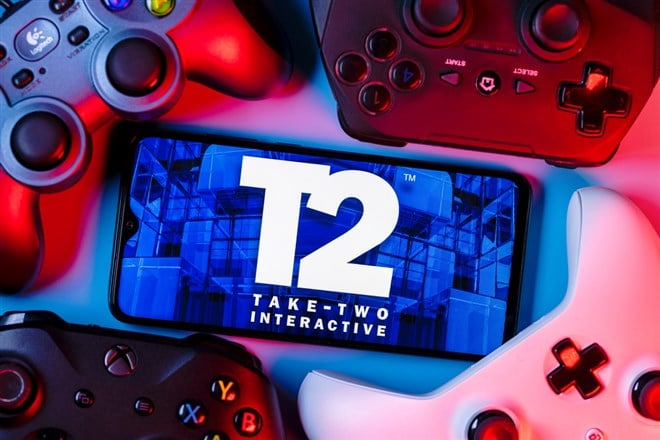 A 7% move higher since the last week of September versus the 3% drop seen in the NASDAQ index should tell you a lot about the potential in Take-Two Interactive Software Inc. (NASDAQ: TTWO). It’s true that the video game maker has put in a tough year so far, with shares recently down 40% from January levels, but there are signs that things will change for Take-Two Interactive stock.
A 7% move higher since the last week of September versus the 3% drop seen in the NASDAQ index should tell you a lot about the potential in Take-Two Interactive Software Inc. (NASDAQ: TTWO). It’s true that the video game maker has put in a tough year so far, with shares recently down 40% from January levels, but there are signs that things will change for Take-Two Interactive stock. Toward the back end of last week, Goldman Sachs upgraded the New York-headquartered company to a "buy" rating, noting that while the near-term situation is fluid, the long-term trends are still strong. Analyst Eric Sheridan and his team pointed out that the long-term trends should start to emerge in 2023 and 2024 because the company's content pipeline should "result in improved revenue growth and expanding margins" with games moving from development to launch. As part of the same move, the team also boosted its price target from $131 to $165. When shares closed on Monday of this week, that points to an upside of around 40%, not a bad number considering how weak the broader market looks.
Turning the Tide
After staging a decent rally through most of the summer, equities have since sank to fresh lows, confirming the bulls’ worst thesis. It looks like we're in serious correction mode, what with the ongoing cat-and-mouse game between the Fed and consumers and inflation set to continue into next year. This signals uncertainty for investors and almost always results in dampened demand for stocks, especially the non-cyclicals.
Take-Two is firmly in that camp, and even after a 50% haircut from last year’s all-time high, it still has a fluffy price-to-earnings (P/E) ratio of 77. This is a far cry from the lower double-digits investors demand from tech stocks before they wade in, but it’s not an absolute necessity. Especially in light of the multi-month sell-off, there’s a strong argument to be made that the worst-case scenario for Take-Two is already baked into the share price. For context, shares are trading at where they spent much of 2017. It’s like the whole pandemic-driven video game demand never happened.
This macro driven slowdown in the video game industry was highlighted by Bank of America (NYSE: BAC) toward the end of September. The industry analysts expect a recession to impact game sales just as it has in past crises, with consumers understandably pulling back on discretionary spending. They expect game sales to fall up to 6% throughout, which would be considerably less than the 20% decline seen in 2009. This theory is built on the assumption of a more mild recession and greater diversification in the industry into live services and subscriptions in the next 10-plus years.
Getting Involved
Take-Two has certainly been one of the leaders in that industry move, with brands like Grand Theft Auto among the most popular online game subscriptions in the world.
What do the technical signs say? For starters, shares have put in a very attractive double bottom from last May’s dip and maybe even a quintuple bottom if investors stretch the chart back far enough. It’s around the $85 to $105 level that shares have continuously been snapped up anytime they’ve gone that low in the past four or five years. Keeping it to recent history, they held the $100 mark during the COVID-19 sell-off, held the $102 mark during this past May sell-off and will likely hold the $110 mark during last month’s dip.
To the upside, shares will track for the $130 mark and must break through that level to confirm that a rally is on. With the MACD having a bullish crossover last week and with the stock’s RSI trending steadily upward, Take-Two shares may look like a buy toward the end of the year.





